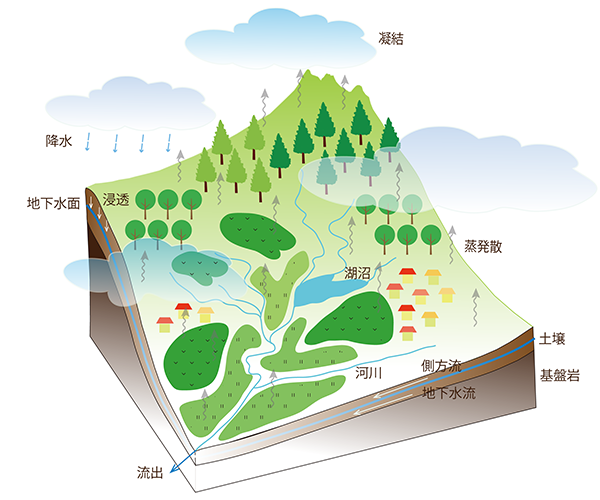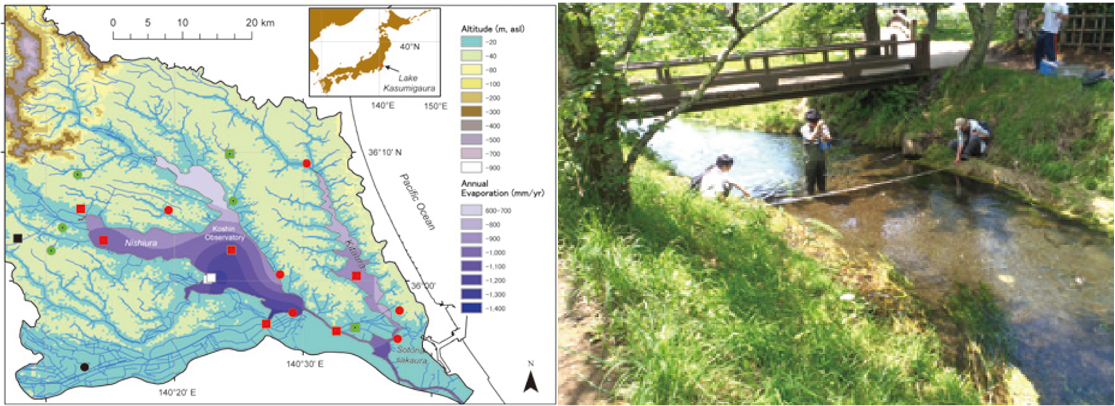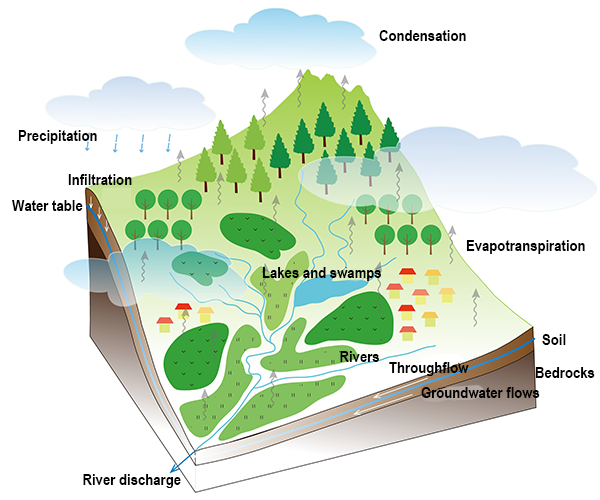キーワード: 水文科学、水循環、水環境、陸域環境、地球環境
http://www.geoenv.tsukuba.ac.jp/~hydro/
 海には膨大な量の水がありますが、そのほとんどは水資源として利用できません。大気中の水が雨や雪として陸域に降り、それが海に流れ去ってしまうまで、あるいは蒸発して再び大気へと戻るまでの間の水だけが、人間の生命維持や農業生産・工業活動に利用できるのです。水の無限の恩恵に預かるためには水循環を正しく理解し、適正な利用を心がける必要があります。「水文科学」リサーチユニットでは、水循環プロセスの解明をつうじ、地域や地球規模の環境問題の解決とその基盤となる基礎科学の発展に挑戦しています。
海には膨大な量の水がありますが、そのほとんどは水資源として利用できません。大気中の水が雨や雪として陸域に降り、それが海に流れ去ってしまうまで、あるいは蒸発して再び大気へと戻るまでの間の水だけが、人間の生命維持や農業生産・工業活動に利用できるのです。水の無限の恩恵に預かるためには水循環を正しく理解し、適正な利用を心がける必要があります。「水文科学」リサーチユニットでは、水循環プロセスの解明をつうじ、地域や地球規模の環境問題の解決とその基盤となる基礎科学の発展に挑戦しています。
過去・現在・未来、小スケールから地球規模まで、水環境のすべてを理解する

図1:水の循環プロセス
水は私たちの生命にとって無くてはならないものです。また、その存在と流れの過不足から生じる災害や飢饉などにより私たちに大きな影響を及ぼします。水文科学は、そうした様々な問題の根源や解決の糸口を見出すために、水の循環やその変質プロセスをまるごと理解しようとする学問です(図1)。このために、過去から現在の状況を把握し、そのモデル化を通して将来予測につなげます。たとえば、研究フィールドの1 つモンゴルでは、水の通過量(フラックス)と貯留量、滞留時間等の計測をもとに地域環境と水循環の現状を把握し、水文・生態系モデルを活用することで、過去から現在まで放牧がなぜ持続的に行われてきたのかを明らかにすると共に、将来の地球温暖化や放牧圧増加にともなう変化の予測を行うことも可能になってきています。
地域や地球規模の環境問題の解決の鍵を握る水循環
地球温暖化、砂漠化、酸性雨といったグローバルな環境問題のみならず、身近な環境問題の解決にも、水循環が重要な鍵を握っています。たとえば、霞ヶ浦は水質の回復が進んでいません。周辺からの物質の流入は主に水が媒介になっているので、その流れを正確に把握することが大事です。さらに霞ヶ浦のような湖沼はCO2 ガスの吸収・放出を通して地球大気のCO2 濃度にも影響があることが分かってきています。この理解のため、水や二酸化炭素の輸送量を現地観測やモデル化を通して明らかにしてきました(図2)。このように本リサーチユニットでは、所属する研究者が協力し、1)水文過程の各プロセスのメカニズムの解明、2)水収支に基づく対象地域のフラックスと貯留量、滞留時間の解明、3)水文現象と環境との相互作用の解明を主な目的として、小スケールから地球規模までの水文過程と環境との相互作用の現状を把握、モデル化による過去の復元、将来の予測に挑戦しています。

図2: 霞ヶ浦からの水蒸気フラックスの計算結果(左)とフィールドでの河川流量調査風景(右)
社会への貢献・実績
- UNESCO-Chair によるモンゴルにおける地下水資源の持続可能な管理に関する科学協力事業
- つくば市:小中学校における環境教育カリキュラムの作成
- 文部科学省教育協力拠点形成事業「国際協力イニシアティブ」:水資源・環境・ 災害教育協力モデルの最適化
取材:平成27年7月9日
To benefit from water infinitely
Unit members : Yamanaka, Tsutomu Asanuma, Jun Tsujimura, Maki
Unit name: Research Unit on Hydrologic Science
Key words: hydrologic science, water cycle, water environment, land area, global environment
http://www.geoenv.tsukuba.ac.jp/~hydro/index-e.htm
 Although there are significant amounts of water in the sea, most of it cannot be used as water resources. When water in the atmosphere has fallen to the ground in the form of rain or snow, humans can utilize the water to support the lives of people, for agricultural production, and industrial activities only until it flows into the sea or vaporizes into the atmosphere. If people wish to benefit from water infinitely, they need to correctly understand the water cycle and appropriately utilize water. The research unit: “Hydrologic Science”, aims to clarify the process of the water cycle to address environmental issues at regional and global levels, and promote the development of basic science as the basis of these issues.
Although there are significant amounts of water in the sea, most of it cannot be used as water resources. When water in the atmosphere has fallen to the ground in the form of rain or snow, humans can utilize the water to support the lives of people, for agricultural production, and industrial activities only until it flows into the sea or vaporizes into the atmosphere. If people wish to benefit from water infinitely, they need to correctly understand the water cycle and appropriately utilize water. The research unit: “Hydrologic Science”, aims to clarify the process of the water cycle to address environmental issues at regional and global levels, and promote the development of basic science as the basis of these issues.
Comprehensive understanding of regional- and global- scale water environments in the past, at present, and in the future

Figure 1: Water cycling process
Water is essential for our lives. Furthermore, disasters and famines caused by excess or scarcity of water significantly influence the lives of people. Hydrologic science aims to understand water cycles and the processes of their changes comprehensively to identify the underlying causes of various problems and keys to their solutions (Figure 1). The unit examines water cycles in the past and their current status, and models them to predict their future changes. For example, in Mongolia, one of our research fields, we assess the flux, storage and residence time of water to understand the statuses of the regional environment and water cycles, examine the reason why grazing has long been conducted in the region, and predict changes expected to occur in the future due to global warming and increased grazing pressure.
Water cycles as the key to the solution of environmental problems at regional and global levels
Water cycles are an important key to the solution of not only global environmental problems, such as global warming, desertification, and acid rain, but also regional environmental problems. For example, there has been little improvement in the quality of the water of Lake Kasumigaura. Since foreign substances from the surrounding area are transported into the lake primarily by water, it is important to accurately understand its flow to improve lake water quality. Furthermore, studies have suggested that the absorption and emission of CO2 by lakes and swamps, including Lake Kasumikaura, influence atmospheric CO2 levels. To clarify this point, we have been conducting on-site observations and modeling to determine the quantities of water and CO2 transferred (Figure 2). Researchers of the research unit collaborate with each other to study hydrological processes through estimation of fluxes, storage and residence time and examine the status of interaction between hydrological processes and environments on both regional and global.

Figure 2: Results of the measurement of the water vapor flux from Lake Kasumigaura (left) and a scene of a survey of the river flow rate (right)
Social contributions and achievements
- Collaborative science project on the sustainable management of groundwater resources in Mongolia conducted by the UNESCO-Chair
- Tsukuba City: Development of curriculums on environmental education in elementary and junior high schools
- “International Cooperation Initiative” – a project for the development of centers for educational cooperation implemented by the Ministry of Education, Culture, Sports, Science, and Technology: Optimization of models of water resource, environments, and disaster education cooperation
Interviewed on July 9, 2015
